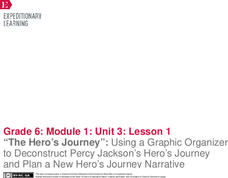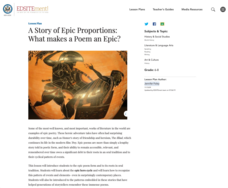EngageNY
“The Hero’s Journey”: Using a Graphic Organizer to Deconstruct Percy Jackson’s Hero’s Journey and Plan a New Hero’s Journey Narrative
Time to go on a journey! Using a graphic organizer, scholars deconstruct Percy Jackson's hero's journey from the Rick Riordan novel, The Lightning Thief. Next, they begin planning their own hero's journey narrative, creating a profile of...
EngageNY
“The Hero’s Journey”: Analyzing a Model Narrative and Continuing to Plan a New Hero’s Journey Narrative
Many elements go into an engaging narrative story. Using a helpful resource, scholars analyze a model narrative and deconstruct it using a graphic organizer. Next, they apply their learning from the model to update their plans for their...
EngageNY
Writing to Show, Not Tell: Dialogue, Sensory Words, and Strong Action Verbs
Consume, gobble, devour ... serving up strong verbs! Writers focus on using dialogue, strong action verbs, and sensory details in their writing. After analyzing a model narrative, they apply their learning to their own hero's journey...
EngageNY
The Hero’s Journey, Part 1: What is a Hero?
That was heroic! Scholars quickly look over What is a Hero to determine and discuss the structure of the text. They then read the introduction and Act 1 closely to find the gist and annotate the text. They circle unfamiliar words and...
EngageNY
End of Unit 1 Assessment: Drawing Evidence from Text: Written Analysis of How Percy’s Experiences Align with “The Hero’s Journey”
Do your best on the test! Readers finish up by completing the end of the unit assessment. Using the assessment, writers describe how Percy's experiences in The Lightning Thief align to four parts of The Hero's Journey. After completing...
MENSA Education & Research Foundation
I Need a Superhero
Once the class learns about the hero's journey, they'll find it in every story and movie they see! Take characters from their humble beginnings to their atonement and apotheosis with a set of lessons about the hero's journey focusing...
Curated OER
Tears of Joy Theatre Presents Anansi the Spider
Accompany the African folktale, Anansi the Spider, with a collection of five lessons, each equipped with supplemental activities. Lessons offer multidisciplinary reinforcement in English language arts, social studies, science, and arts...
EngageNY
Writing with Evidence: Percy and the Hero’s Journey (Chapter 7)
Read, set, write! Scholars participate in the first fully independent writing task of the unit as they write about how Percy’s experience in The Lightning Thief aligns with The Hero’s Journey. To begin their writing, they complete a...
EngageNY
Grade 10 ELA Module 4: Unit 2, Lesson 19
A tragic play includes imperfect heroes, pity and fear, and a fatal flaw. Scholars analyze Shakespeare's Macbeth as an example of the tragedy genre. Pupils demonstrate understanding by completing a Quick Write discussing how Shakespeare...
EngageNY
Grade 9 ELA Module 1: Unit 3, Lesson 19
To prepare for the unit's final assessment essay, class members collaborate to find evidence that reveals Romeo and Juliet as tragic heroes.
EngageNY
Grade 9 ELA Module 1: Unit 3, Lesson 20
The final session in this 20-lesson plan unit asks individuals to use their Quick Writes, discussion notes, worksheets, and annotated text to craft and support a claim about how Shakespeare develops either Romeo or Juliet as tragic heroes.
EngageNY
Selecting Evidence: “The Hero’s Journey” and The Lightning Thief (Chapter 6)
Take a closer look. Scholars learn how to read closely using chapter six in The Lightning Thief. While reading, they write the gist of paragraphs on sticky notes and stick them in the book. They then answer text-dependent questions over...
EngageNY
Grade 9 ELA Module 2, Unit 3, Lesson 3
"We need forgiveness and someone to blame." True? Class members continue their analysis of the central claims in Walter Mosley's essay and the support he offers for these claims about people's fascination with crime.
Curated OER
The Adventures of Huckleberry Finn
A viewing of Disney’s 1993 film of The Adventures of Huck Finn launches an examination of the events in and themes of Mark Twain’s story. Viewers respond to prompts on a film story worksheet, engage in full-class discussions, and select...
McGraw Hill
Study Guide for Island of the Blue Dolphins
Dive your class into a reading of Island of the Blue Dolphins with this in-depth study guide. Breaking the novel into three parts, the resource begins each section with a focus activity that identifies a specific theme or question to be...
Scholastic
Frindle Lesson Plan
"Who says a pen has to be called a pen? Why not call it a frindle?" Inspired by this quote from the award-winning novel written by Andrew Celements, this lesson allows children to invent their own terms for common classroom objects,...
National Endowment for the Humanities
A Story of Epic Proportions: What Makes a Poem an Epic?
Learners analyze the epic poem form and its roots in oral tradition. In this epic poetry lesson, students research the epic hero cycle and recognize the pattern of events and elements. Learners analyze the patterns embedded in the stories.
National Endowment for the Humanities
Chinua Achebe's Things Fall Apart: Oral and Literary Strategies
Readers are first introduced to Chinua Achebe's Things Fall Apart by making a map of Africa. They will better understand the novel's historical and literary contexts, European and African literary traditions, and how historical events...



















